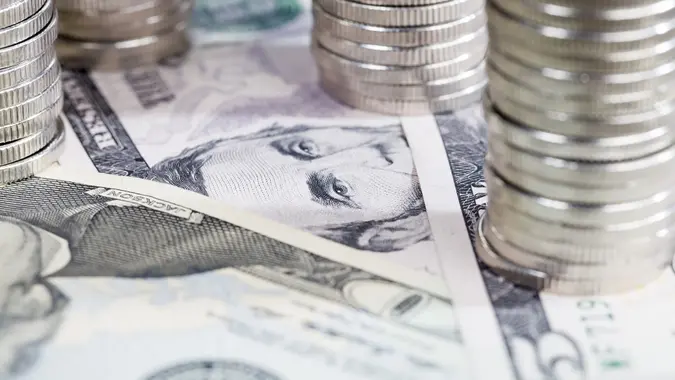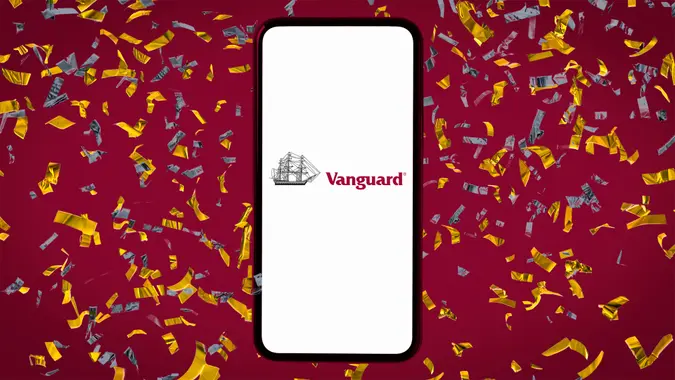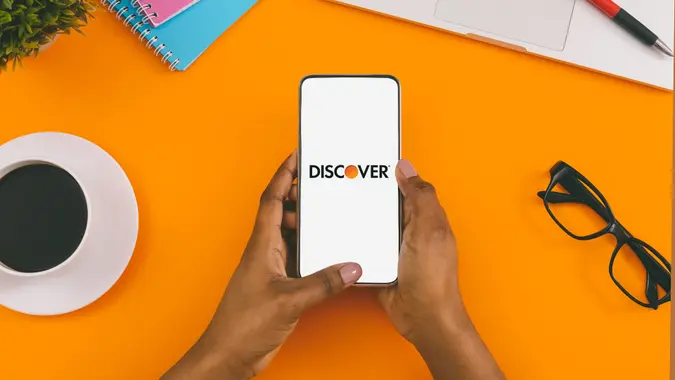What Is the Typical Minimum Balance on a Certificate of Deposit?

Commitment to Our Readers
GOBankingRates' editorial team is committed to bringing you unbiased reviews and information. We use data-driven methodologies to evaluate financial products and services - our reviews and ratings are not influenced by advertisers. You can read more about our editorial guidelines and our products and services review methodology.

20 Years
Helping You Live Richer

Reviewed
by Experts

Trusted by
Millions of Readers
A CD’s minimum balance is the minimum deposit needed to open it. The minimums vary by bank or credit union, and even by various CD products within the same financial institution.
Banks set minimum balance requirements to:
- Maintain a certain level of cash reserves
- Issue loans on which they charge interest
- Hold onto customers by locking in their deposits until their CDs mature
Typical Minimum Balance for Certificates of Deposit
Every financial institution sets its minimum balance requirements for CDs. Banks might even set different minimums for every different type of CD product. Most range from $500 to $1,000, but it can be higher.
Occasionally, you can find a CD with no minimum deposit.
Why Minimum Balances Matter
Understanding the minimum your CD requires is really important, because:
- You can’t access that money for the entire term of the CD. Taking your money out early can cost you an early withdrawal fee.
- The minimum can also impact the interest rate your CD earns. Banks that offer tiered rates typically pay higher rates for higher balances — up to a point. Rates at some banks fall once balances exceed a certain level.
Before you tie up your money in a CD, make sure it’s the best option for you.
How To Choose the Right CD for Your Budget
A good place to start planning your CD purchase is by creating a budget. That might seem like overkill, but until you know how much money you have coming in, how much is going out and how much you need to meet your savings goals, it’s hard to know how much you can deposit into a CD.
Start by subtracting your monthly expenses from your monthly income, then decide how to prioritize your leftover cash. Experts recommend the following:
- Emergency fund totaling three to six months’ worth of living expenses
- High-interest debt repayment
- Retirement savings — 5% to 10% of your income if you’re a young adult, gradually increasing to 15% as your earnings increase
Next, open a savings account for shorter-term goals like a vacation or major purchase, and budget money to put toward those goals.
The income that remains is money you can use to open a CD. It’s a good idea to compare CD rates and terms from many different banks to find the best deals. As you shop, keep an eye out for “CD specials” and other promotions offering higher rates than you’ll get with a standard CD.
Once you’ve decided which CD you want and how much you want to deposit, you can use your savings account to save up the amount you need.
Alternatives to Traditional CDs for Low-Balance Savers
Not everyone has cash they can tie up for a year or more, in a CD. That’s OK — You can still earn high yields with low or no commitment.
No-Minimum CDs
Several banks, including online ones like Ally and Discover, offer high-yield CDs with no minimum balance requirements. You’ll have to fund the account to earn interest, but your deposit can be as small as you’d like.
Short-Term CD
CD terms can be as short as a month. Although you might make less in interest with a shorter term CD, it gives you the flexibility to access your money more often.
Flexible CDs
With most CDs, you make a single deposit to open the account and can’t add or take out money until the CD matures. Flexible CD options, such as add-on and no-penalty CDs, let you start small and add money later, and/or access your money without penalty before the CD matures.
CD Ladder
A CD ladder is a bundle of CDs with staggered terms. Laddering keeps some of your money in shorter-term CDs so you can access it sooner, and some in longer-term CDs offer higher rates.
High-Yield Savings Account
Rates on high-yield savings accounts can be comparable to CD rates — sometimes even better. Plus, you don’t lose access to your money. Online banks pay some of the highest rates, often with no minimum deposits and no monthly fees. The downside is that the rates are variable and can change without notice.
Money Market Account
Money market accounts are savings accounts, but they typically have some of the same features as checking accounts. You can write at least a handful of checks each month and withdraw money at ATMs, for example.
Overall, money market rates are lower than high-yield savings account rates and rates on all but the shortest-term CDs. However, a few banks offer higher yields similar to high-yield savings accounts. Just watch out for monthly maintenance fees.
Treasury Bills
Investing in Treasury bills equates to making a short-term loan to the federal government. You can invest as little as $100 and for as few as four weeks. Not only are T-bill rates competitive, but the interest you earn is tax-free. Contact your bank for information on how to invest.
Andrea Norris contributed to the reporting for this article.
FAQ
Many banks have minimum balance requirements for CDs, but don't let that stop you from opening one. Learn more with these frequently asked questions.- What is the average CD minimum at major banks?
- Minimums at the Big 4 banks -- Citi, Wells Fargo, Bank of America and Citi -- range from $500 to $2,500, for an average of $1,250.
- Are there CDs with no minimum balance?
- Yes. A number of banks offer CDs with no minimum balance requirements.
- How can I open a CD if I don't meet the minimum balance requirement?
- If you can't meet the requirement at one bank, look for CDs at other banks, including online banks like Ally and Discover.
- Is it worth saving for a CD with a high minimum balance?
- Possibly. If rates fall while your money is locked in, you'll benefit by the higher fixed rate. If rates increase while you're locked in, a longer term could cause you to miss out on interest. Also consider how else you might use some of that money -- to pay down debt, for example, or invest in a retirement account.
- Can the minimum balance change during the term of the CD?
- No. Once you buy a CD, the minimum balance doesn't change.
Our in-house research team and on-site financial experts work together to create content that’s accurate, impartial, and up to date. We fact-check every single statistic, quote and fact using trusted primary resources to make sure the information we provide is correct. You can learn more about GOBankingRates’ processes and standards in our editorial policy.
- S&P Global. "US banks increasing reliance on CDs as funding pressure builds."
- FDIC. "National Rates and Rate Caps."
- Treasury Direct. "Treasury Bills."
 Written by
Written by  Edited by
Edited by 

























